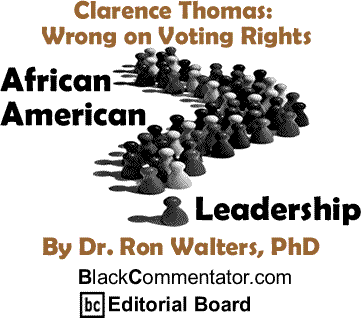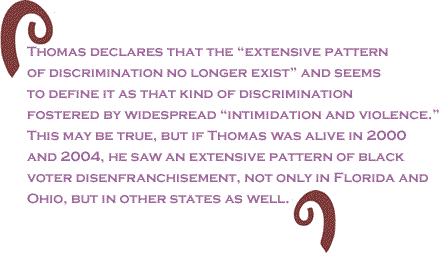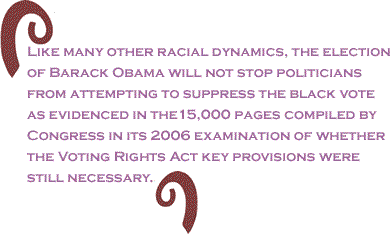
|
|||||||||||||||||||||||

|
|

Custom Search
|
|
 |
|
It is worth noting that when the Supreme Court rendered its most recent decision on whether to uphold Section 5 of the Voting Rights Act in the Austin Municipal district case, Justice Clarence Thomas was the only one to vote against it in the 8-1 decision. That isolated vote was a monumental confirmation of many things his opponents have been saying about his lack of fidelity – indeed his hostility – to the Africa American civil rights tradition. What makes it so bad was he was wrong on the basis for his rejection of the responsibility of the Justice Department to pre-clear changes in voting procedures for certain selected states that have historically practiced discrimination. Some aspects of Thomas’ logic as stated in his dissenting opinion was that: “The extensive pattern of discrimination that led the Court to previously uphold Section 5 as enforcing the Fifteenth Amendment no longer exists. Covered Jurisdictions are not now engaged in a systematic campaign to deny black citizens access to the ballot through intimidation and violence.” As a result, “Punishment for long past sins is not a legitimate basis for imposing a forward-looking preventative measure that has already served its purpose.” Clearly, Thomas’ analysis is rooted in a past notion of what constitutes black voter disenfranchisement. He declares that the “extensive pattern of discrimination no longer exist” and seems to define it as that kind of discrimination fostered by widespread “intimidation and violence.” This may be true, but if Thomas was alive in 2000 and 2004, he saw an extensive pattern of black voter disenfranchisement, not only in Florida and Ohio, but in other states as well. The new tactics are based on skillful manipulation of aspects of the voting system. When voter lists are purged and black voters disproportionately taken off, the notorious reason in Florida in 2000 was that they were wrongly perceived to be felons. Republicans have been known to practice “vote caging” in black districts, sending post cards to find out if they are returned saying the person registered to vote does not live there. Black votes are disproportionately spoiled by voting machines for a host of reasons and blacks have also been denied access to provisional ballots in some places. Sufficient voting equipment is often unavailable in black districts and officials are often not as helpful. Then, there are the old problems of boxes of ballots going missing and police showing up in black neighborhoods on election day to intimidate voters. Yes, the old tactics have declined, but they have been replaced by more sophisticated tactics that are no less effective in paring down the black vote. If any of these tactics had not been effectively practiced in 2000 and probably 2004, George Bush would not have been elected President.
True enough, Section 5 of the Voting Rights Act has served its purpose, but the Republican party has been consistent in attempting to get around it by passing voter ID laws in southern states such as Georgia where the Secretary of State has testified that it would have negative effect on black voters most of all. Then, the Bush administration’s Justice Department failed to enforce Section 5 in many cases. I validated this when attending a meeting with the Assistant Attorney General for Civil Rights with Rev. Jesse Jackson and Louisiana Rep. Cleo fields who objected to his Legislature changing the date of the New Orleans mayoral election, shortly after the Katrina Hurricane struck. After the meeting, he received a letter from the Civil Rights division saying it routinely had approved such changes in voting procedure after they were made – clearly violating Section 5. In all of this, there is the ring that since the United States elected an African American President, the protection of voting rights based on the Justice Department monitoring voting procedures is no longer needed, since the African American vote performed so decisively. But, like many other racial dynamics, the election of Barack Obama will not stop politicians from attempting to suppress the black vote as evidenced in the15,000 pages compiled by Congress in its 2006 examination of whether the Voting Rights Act key provisions were still necessary. After all, the responsibility to pass appropriate legislation to see that states did not deny a person the right to vote was given to the Congress by the 15th Amendment to the Constitution. In passing such legislation in 2006 Congress found that it was certainly appropriate and Justice Thomas should respect that. BlackCommentator.com Editorial Board member Dr. Ron Walters is the Distinguished Leadership Scholar,
Director of the African American Leadership Center and Professor
of Government and Politics at the University of Maryland College
Park. His latest book is: The Price of Racial Reconciliation (The Politics of Race and Ethnicity)
|
|
Any BlackCommentator.com article may be re-printed so long as it is re-printed in its entirety and full credit given to the author and www.BlackCommentator.com. If the re-print is on the Internet we additionally request a link back to the original piece on our Website. Your comments are always welcome. eMail re-print notice
If you send us an eMail message we may publish all or part of it, unless you tell us it is not for publication. You may also request that we withhold your name. Thank you very much for your readership. |
|
| |
|
| July
2, 2009 Issue 331 |
|
| Executive Editor: Bill Fletcher, Jr. |
| Managing Editor: Nancy Littlefield |
| Publisher: Peter Gamble |
| Est. April 5, 2002 |
Printer Friendly Version
in resizeable plain
text format or pdf
format. |
| Frequently Asked Questions |
 |

|
 |
 |
 |
| |
| |




































